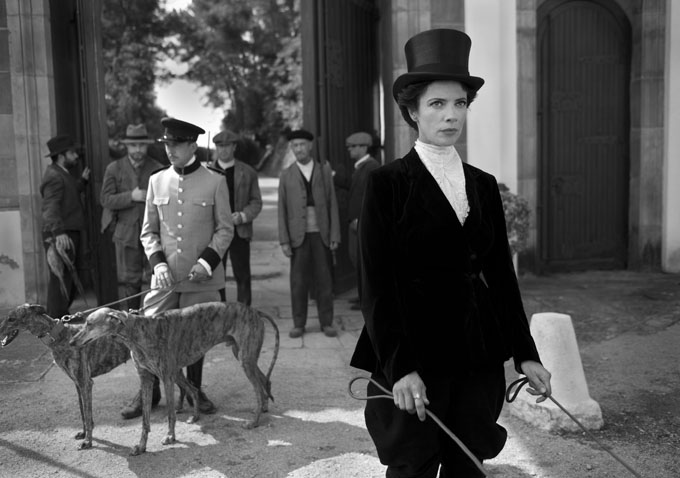 Fetishize the past all you
Fetishize the past all you
want. The silent era gave way to a flood of cinematic storytellers ranking well
amongst the greats. You didn’t need sound to realize a filmmaker like Fritz
Lang was stretching the medium so far that it would take a couple of decades of
talkies for anyone to match his vision. Similarly, the early silent works of
Alfred Hitchcock belie a startling vision and knack for experimentation not
commonly associated with filmmaking at the time. There’s a reason we think back to the silent
classics of yesterday: some of those film are absolutely phenomenal, still enthralling
today for the film buff with a bit of patience (a small percentage of
the populace, but whatever), and still transformative, capturing the imagination
in ways some contemporary THX-scored noisemakers fail to do.

But there’s a reason we don’t
make silent films anymore. A lack of sound isn’t a tool itself, but rather an
unnecessary handicap that places a deeper responsibility on the craft of the
filmmaker. Recently employed in the Best Picture Oscar winner “The
Artist,” Michael Hazanavicius only had interest in the lack of
sound as a cheap gimmick. That gimmick is eventually botched as Hazanavicius
employs a style of editing from the forties and beyond, and a sense of rhythmic
editing from even after that. Moreover, given that the film deals with a silent
star who cannot transition to the talkies, it’s even demeaning: the familiar
story would carry more weight if we grasped his conundrum with sound (and
perhaps color), but the lack of sound only patronizes the audience into
embracing the lead and demonizing innovation, the last part of that decision
not motivated by politics or point of view.
Fortunately, in the case of “Blancanieves,”
the silent film concept is best served with a less rigorously academic approach, attached
to the theme of a timeless fairy tale instead of a vainglorious show business
satire. This would be another “Snow White” story, following last year’s “Snow
White And The Hunstman” and “Mirror Mirror.” But while ‘Huntsman’ trapped its heroine in a tired world of “Lord of the Rings”
fantasy-battle clichés, ‘Mirror’ managed to mock the original fable by turning
it into a musical treatise on aging in Hollywood. “Blancanieves” takes a
different tack, bringing the action to 1920s Spain.

This film’s Snow White is
Carmen, a sweet little girl who reverently adores her kindly father. Little
does she know that behind the scenes, his caretaker Encarna (Maribel Verdú) has
arranged to seize the sickly old man’s cash, becoming a queen herself as he
slides into the afterlife. From there, Encarna entertains slaves and lovers,
some considerably younger than her, as Carmen struggles to find out the truth
about her father’s passing. With some casual familial catfighting, Encarna
reveals herself to be territorial and demanding, enough to not understand
Carmen’s refusal of the flimsy explanations of her father’s death.
Eventually, exile arrives and
Carmen, now in her teenage years, must struggle to survive despite having
enough smarts and ingenuity to avoid Encarna’s charmless thugs. Seeking refuge
in a circus, her search for a father figure leads her into the arms of seven
mismatched dwarves. In a bit of a modern twist, she takes the opportunity to
follow in her father’s footsteps and become a bullfighter, gaining assistance
and friendship from her seven small partners, all of whom are in love with her to varying degrees.
 You don’t need to know the
You don’t need to know the
resume of Maribel Verdú to know that the “Y Tu Mama Tambien” star is this film’s
meal ticket. With an equal division of screentime with her co-star, Verdú’s ferocious sexuality projects that she was meant to become the fairest of
them all by sheer force of will. Verdú vamps and growls and genuinely looks
gorgeous in the film’s black and white. There’s a reason this role went to
Charlize Theron and a hammy Julia Roberts in last year’s “Snow White” films: it’s
the chance for an (relatively) older actress to break through and have some naughty fun.
Verdú seems like she’s having fun without being campy, a smile that is likely
to hint at a temporary façade used while the wheels start to click into place.
Her Encarna seems far enough ahead of the game that it almost seems unfair to
the other actors that scenes with Verdú are destined to result in her overshadowing
them.
The film stays true to its
silent roots with a musical score that seems appropriately chintzy. Even if
PETA activists won’t be amused, there’s a grace and grandeur to the
bullfighting scenes that, portrayed with black and white editing and
photography, make the sport seem larger than life: they’re shot in an immersive
manner that puts to shame the 3D theatrics of most in-your-face blockbusters.
And director Pablo Berger’s film also manages to find a neat twist on the classic
formula, integrating the poisoned apple in a story stripped of supernatural
artifice, but still feeling vaguely fantastical. Oddly enough, “Blancanieves”
ends on a beautifully romantic, tragic note, maintaining the story’s ages-old
hold on younger audiences, while also presenting a ghoulish conclusion that
feels authentic and well-earned. The silent trappings seem like a gimmick when
employed in 2013, but the story’s impact is never dulled. [B+]

